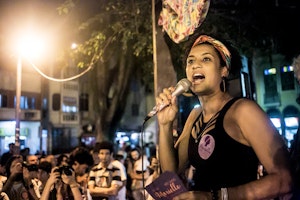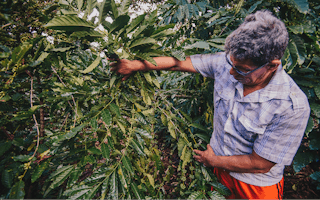Q&A: Marielle Franco’s Enduring Legacy

In 2018, Marielle Franco, the anticorruption advocate and first gay woman of color to be elected to Rio de Janeiro’s City Council, was murdered in broad daylight and under suspicious political circumstances. Recently, Anielle Franco, a consultant to the Open Society Foundations’ Latin America Program, spoke with the Open Society Public Health Program’s Gabriela Barros de Luca about her sister’s legacy.
What work are you involved in these days?
I am working on a project my sister and I started in 2015 called Straight Talk (or Papo Franco in Portuguese). During Marielle’s first campaign for city council, we started doing roundtable conversations with children and teenagers in the most underserved public schools, with NGOs, and with grassroots activists because Marielle believed that Brazilians would not vote for a Black woman from the favela.
Following her death, I had a dream about her on her birthday telling me to go back to work. Papo Franco can change lives, especially for teenagers who live in poor neighborhoods in Brazil. They need to learn about Marielle’s story so that they know that rising to power is difficult, but possible. They need to feel motivated to carry on Marielle’s mission and resist attempts to weaken and delegitimize the causes she fought for, which were bigger than her and remain very much alive and as important as ever in today’s Brazil.
What motivates you?
I’m determined to inspire a new generation of leaders, letting others with a similar background as Marielle’s know that they matter and that they should take advantage of all opportunities they can find to raise their voices. I believe, and Marielle believed, that this can really create change.
The idea to relaunch Papo Franco after Marielle’s assassination actually emerged from conversations within my family, where we realized we had a responsibility to combat misinformation and inaccurate news reports about who Marielle was in order to preserve her memory.
Her critics and detractors pushed stories after her death, and especially during last year’s presidential election, that misrepresented my sister and sought to diminish her. This felt like a second blow to the family. First, they take her life and, now, they want to take her memory. We could not stand for that. We wanted to take action so that we could set the record straight and continue building on Marielle’s work to empower a new generation of Marielles.
I am working to get Papo Franco online to reach a wider audience of disenfranchised, marginalized people, particularly Black women from favelas, and empower them to get engaged in advocacy—whether that means raising awareness of issues they care about to better understanding their local political environment or running for office themselves. The idea is to take Papo Franco to many places, to other Brazilian favelas outside of Rio de Janeiro and maybe even outside of Brazil, where people would never know the story of Marielle Franco.
How can civil society help build the next generation of Marielles?
First, we have to improve our system of education. Today, we have many Marielles in Brazil, but if we don’t improve our education system, and if we don’t help them build power and raise their voice and do something better with their lives, her memory won’t survive for another generation.
That’s why we are trying to preserve collective memory about Marielle; not only so that people know more about her story and work as a politician, but to keep her projects going: raising awareness of problems in favelas, empowering Black women from favelas, battling organized crime and corruption. She really went into the topics that were most controversial and difficult, where racism, corruption, and the Brazilian mafias connected to politicians in office (a group known as milicias) are all intertwined.
How do you plan to continue spreading the word about Marielle and her vision?
This summer, I will have a chance to take this conversation to two historically Black colleges and universities in the United States. I want to bring this conversation from Brazil to a U.S. audience to empower poor, Black women who wouldn’t normally have access to such information. At the same time, I’m also finishing a book about Marielle’s life and our family, Letters to Marielle, which we expect to release in July.
I also spend a lot of time with the public prosecutor assigned to Marielle’s case. While they arrested the shooters, they still have not found who gave the orders to kill her. I’m giving a lot of interviews, writing many articles, and speaking at many events. I’m fortunate to have become a consultant to the Latin America Program at the Open Society Foundations since late last year, with the mission to initiate activities and projects to preserve and spread the memory and legacy of Marielle Franco.
This has also helped me think through and take the first steps to launch what is now officially called the Marielle Franco Institute, a nonprofit organization in Brazil that will soon become the vehicle for several activities, including the coordination of Papo Franco conversations.
What do you think your sister’s legacy will be?
What I know is that her legacy will be huge and something bigger than it is now. Four Black women were elected to public office in Brazil after her death including three to the Rio State Assembly. I do not know if I can measure her legacy. So many Black women, LGBT women saying that Marielle inspired them. She’s among the top 10 most influential people from favelas not only in Brazil but in all of Latin America (according to UN Women research conducted in February 2019).
We still do not know why exactly she was assassinated, but she is a symbol of power and of our struggles in Brazil. Marielle sat at the intersection of so many important movements. She is a symbol of resistance—not just for Black women, but for bisexual women, women from favelas, young mothers working multiple jobs to sustain their families, and more.
It’s difficult to think of a more inspiring figure than my sister in Brazil right now. Her face is on posters all over Brazil, which is sometimes even problematic for us in the family. Her face has become iconic and is everywhere—street graffiti, fashion designer clothes, calendars—generally coming from a good place, but spreading and using her image in a way family might not always be comfortable with.
Is there reason to be hopeful about Brazil’s future?
It’s difficult to be hopeful right now, but we have to be. I have a daughter, as well as my sister’s daughter to care for, and I can’t give up hope.
Earlier this summer, we went downtown to protest cuts to education spending. Hours before the rally was to begin, people had already gathered there. That was so inspiring to see because it means that people did not give up fighting the good fight. We have taken many blows but we are still fighting.
We cannot let fear and hatred paralyze us from taking action. That’s what Marielle taught us, and what I will try to transmit through Papo Franco. Even when life is hard, we need to keep our eye on the future. We can’t afford to lose time. My family knows this well.
Anielle Franco is a consultant to the Open Society Latin America Program.


